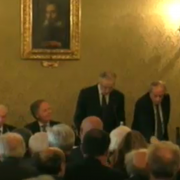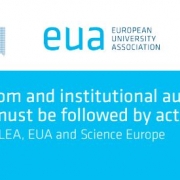ALLEA experts discuss new editorial series ‘Europa’ in Rome
A new book series of the ‘Europa’ editorial delves into the legal, political, scientific, cultural and social dimensions of the European utopia and its future. ALLEA, jointly with its Member Academies, contributed to the discussion of the first three volumes in a conference that complements the series ‘Europe on Test’
During a conference hosted by the Accademia dei Lincei on 26 March 2019, the Istituto della Enciclopedia Italiana Treccani presented its latest publication ‘Europa’: an editorial series in three volumes.

The event was organised with the participation of ALLEA. International speakers from its Member Academies discussed the initiative in general, and each of the volumes respectively.
Honoured by the presence of the President of the Italian Republic Sergio Mattarella, Günter Stock (past ALLEA President) welcomed the participants on behalf of ALLEA. In his speech, he congratulated the editors to a very well-composed publication and to stirring a debate that could not be timelier and more important, not least given the events around the United Kingdom’s attempt to leave the European Union. Referring to the title of the first volume (’Un’utopia in costruzione’), he said:
“As such it [Europe] entails visionary ideas, very hard work, constant reflection and readjustment, as well as an enormous amount of exchange and debate by all of its constituencies – to form a whole that is far greater than the sum of its parts. Utopia should lead to vision, visions should encourage strategic plans, and, most importantly, strategic plans must be complemented by concrete plans for implementation and action.”
‘Europa’ in three volumes
His welcome address was followed by the presentation of the three volumes. Each one was discussed by an Italian scholar, as well as an international discussant representing ALLEA. The first volume focuses on the political, institutional, legal and economic issues that affect the European Union and was discussed by Dame Helen Wallace (British Academy).
The second volume concentrates on the topics of scientific research, technology, infrastructure and innovation policies and was discussed by ALLEA Board Member Pere Puigdomènech (Royal Academy of Arts and Sciences of Barcelona and Institut d’Estudis Catalans).
The third volume deals with socio-cultural aspects, as well as the major social changes that have made possible the unification of Europe and was discussed by Michael Rössner (Austrian Academy of Sciences).
A live video recording of the conference is available here.
Conference Series
The conference complements the ALLEA conference series ‘Europe on Test: Narratives of Union and Disunion‘, organised under the patronage of ALLEA and hosted by selected Academies of Sciences and Humanities in various European cities. Its aim is to address from a variety of disciplinary perspectives the different historical and contemporary socio-political developments that may pose a challenge for the future of Europe as a community.
The upcoming two conferences will take place in Warsaw (11 October) and Torino (7-8 November).
For more information on the ALLEA conference series “Europe on Test” see www.allea.org/europe-on-test-narratives-of-union-and-disunion/




